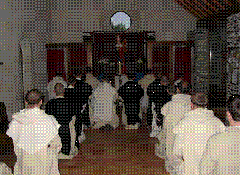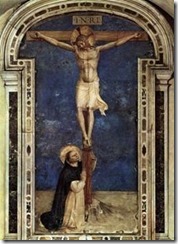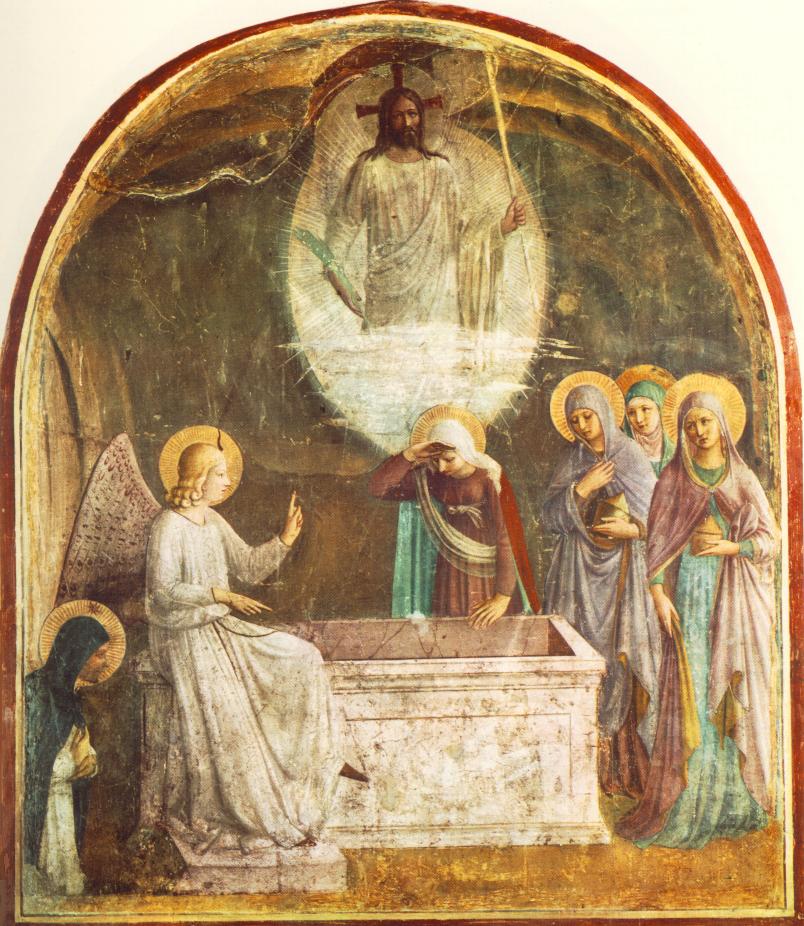A treatise on prayer
by Fr. Wilberforce O.P.
– I –
Prayer in general
The whole spiritual life consists essentially in two grand duties, both of which, but especially the first, must be constant and unintermitting: prayer and mortification. These are the two wings by which we are to fly to Heaven, and without both, progress is IMPOSSIBLE.
Of these two, the first is now to be treated of and examined.
Prayer is the most noble and divine instrument of perfection or union with God, and by prayer alone we can attain to the end of our Creation and Redemption : union of spirit with God, our Creator and Redeemer.
The prayer chiefly to be discussed at present is that known as affective prayer, by which our souls offer and give and consecrate themselves and all they have and all they owe to God, giving him all love, obedience, submission, thanksgiving, etc.
What is prayer ?
Prayer is defined to be « an elevation of the mind to God ». By lifting or elevating the mind we mean making acts by which the soul moves and expresses, or at least implies :
1. An entire dependance on God as the Author and Fountain of all good.
2. A will and readiness to give Him His due, viz all love, obedience, adoration, glory and worship, by humbling an annihilating herself and all created things in His Presence.
3. A desire and intention to aspire to union of spirit with Him.
These things are included in all real prayer.
Prayer, then, is the most perfect and divine action of which man is capable. It is the only principal action the soul was created to accomplish, because the soul was created for union with God, and prayer is the only means to that union. Without prayer, no other means is effective. Therefore, of all other duties and good works that can be done, prayer is above all indispensably necessary.
The necessity of prayer
The following considerations, five in number, suffice to prove the necessity of prayer:
1. By prayer only, through which charity is aroused, strengthened and increased, can we be united to God. In this all good consists. Separated from God, we have only ourselves, viz, corruption, nothingness, misery.
2. By prayer only, all grace – our only good – is a) obtained, b) preserved, c) recovered if unhappily lost. The reason is: to obtain grace, we must have recourse to the Fountain of grace and good. God is that fountain. But recourse can only be had to Him by prayer.
3. By prayer alone can we make external things holy so as to render them means of uniting us to God. Works of zeal, charity, ordinary actions of daily life can only be made [supernaturally] good and acceptable to God so far as they are vivified by internal prayer. Because a good action is only meritorious inasmuch as it is raised and directed to God by an interior motion of the soul, and this interior motion is prayer. To be drawn interiorly to offer up an action to God by charity is therefore an act of prayer.
4. True prayer is incompatible with [mortal] sin in a way nothing else is or can be. A soul remaining with the will attached to sin may perform all other actions, e. g. fasting, almsgiving, joining in choral offices, keeping silence, visiting the sick, obeying superiors, hearing or saying Mass etc., but true prayer of the spirit and an affection to sin are absolutely incompatible and mutually destructive. The reason of this is that :
— internal prayer is the converting and uniting of the will to God;
— sin is averting and separating the will from God.
The two, therefore, being contradictory, cannot dwell together, but one must destroy the other.
5. Prayer is the one sovereign remedy and comfort in all kinds of miseries:
— wether of soul, as afflictions, guilt, remorse, fear, etc.,
— or of body, as pain, poverty, death, etc.
Because the only remedy and comfort for these ills is to rise above them, but this can only be done by union of spirit with God, a union brought by pure prayer.
Consequences
Three consequences follow from these truths:
1. Regarding God; 2. regarding the devil; 3. Regarding ourselves.
1. God gives us special commands about prayer in a way He does about no other duty except charity, which is the object of prayer. We are commanded always to pray as the one necessary thing. « We ought always to pray and not to faint » (Luke 18, 1).
2. The devil desiring our destruction directs all his efforts to make us undervalue prayer ; to disgust us with it ; to persuade us it is useless, too difficult, impossible, unnecessary – for if he can induce us to neglect and abandon internal prayer, by so much he does actually separate us from God.
3. We ourselves must see that prayer is the one thing that at all times and under all circumstances we must always cultivate, energetically pursue, determinately persevere in, because all our hope, all our good is found in prayer alone. We ought to have one aim and business in life, viz: to exercize and increase charity by internal prayer; or in other words to increase within ourselves the quiet but firm determination to please God by constantly an with ever increasing earnestness, raising our spirits to Him; will to will, mind to mind, heart to heart.
Prayer has been described by Father Baker as « an affectuous actuation of an intellective soul to God ».
From this two consequences follow :
1. Prayer of words only is not prayer. Prayer requires an inward attention and affection of soul, though by no means necessarily to the sense of the words uttered. In other words: vocal prayer that is not also mental is no prayer!
2. This most important consequence follows, that thinking, exercising the mind, reasoning, discoursing to oneself about a sacred truth, or meditation on a subject is not itself prayer but only a preparation for prayer, an incitement to pray: for prayer is only immediately exercised by the will, or affections adhering to, and being united to God.
There is, then, no such thing as merely vocal prayer, so that no one must be misled into this error by the division of prayer into vocal and mental. Merely vocal prayer is that pretence of prayer of which God says: « This people honoureth Me with their lips, but their heart is far from Me. In vain do they honour Me » (Mt 15, 8).
But the distinction has a right meaning, for though all prayer must be mental to be prayer at all, some prayer is vocal also, some merely mental without any form of word, and, further than this, prayer may be made with blind elevation of the will to God without any express internal words or definite thoughts.
– 2 –
Vocal prayer
Sometimes vocal prayer can be an instrument conducting a soul to contemplation.
In ancient times many arrived at contemplation by means of vocal prayer, joining to it: 1) extreme abstraction and solitude, 2) rigorous abstinence, 3) immense diligence in prayer.
But we, not having these conditions, must supply them by daily set exercices of mental recollection, to bring about habitual recollectedness.
If God calls a soul to contemplation through vocal prayer, she must:
1. Practise still greater abstraction and mortification than is necessary by the road of mental prayer. Because vocal prayer is not so profound and inward, and does not give such light for regulating the affections.
2. Spend more time in it, for its efficacy is less.
3. If God draws her to internal prayer of aspirations, be ready to follow at once.
If a soul should be drawn (it is most uncommon) by the way of vocal prayer only, it is a secure way, less open to illusions, and less likely to hurt the head, etc.
But as this is a way nowadays almost unknown, mental prayer is necessary. Souls, therefore, must not be tempted to abandon mental prayer for vocal prayer, even if vocal prayers were « clear and undistracted », and the mentel recollections « painful and disturbed ». Persevere, and this will change. Little less than a miracle will make the vocal prayer of imperfect souls to become contemplation. Sudden apparent contemplation, then, must be vehemently suspected.
In the beginning of a spiritual course, vocal prayer is good :
1. For those who cannot manage discursive prayer.
2. For others, if it raise and better their attention to God, provided it yield to internal prayer when they are disposed for it.
3. Vocal prayer of obligation, public or private, must always be attended to.
— Three kinds of attention in vocal prayer
Some kind of attention is necessary for all prayer :
1. Attention of mind to the sense of the words uttered, varying with each verse, etc. This is the lowest kind ; and the more imperfect the soul is, the easier it is.
2. To come to vocal prayer – viz, the Divine Office – with some efficacious affection of soul to God, or letting the vocal prayer raise the heart, and remaining in it as deep recollection as possible, without reference to the changing sense. This is far more perfect, being attention to God and union of affection with Him, which is the object of all prayer. No one should quit this for the first attention.
3. Certain souls in close union with God are able to be profoundly recollected and united to God, and yet to follow the sense without injuring, nay, increasing and simplifying their internal union. This is not before the soul has arrived at contemplation and habitual close union. This is by far the most perfect and uncommon.
– 3 –
Internal affective prayer
Mental or internal prayer is either :
1. Imperfect and acquired ; or
2. Perfect and infused.
The perfect and infused prayer is contemplation ; the imperfect, acquired and active is the preparation for contemplation, which is the end and object of all spiritual exercises.
— Necessity of internal and affective prayer
Internal and affective prayer is the only efficacious instrument of perfect union of spirit with God, i.e. of contemplation.
Cardinal Bellarmine says: « This, I believe, I may most truly and confidently affirm, that without a diligent pursuit of internal prayer, none will ever become truly spiritual, nor attain to any degree of perfection. Many go often to the sacraments, and yet remain as imperfect as before. Nay, many religious and priests read Scripture, receive and celebrate often, perhaps daily, and yet are devoid of devotion and the Spirit of God, cold in love, earnest in love of vanities, full of impatience, envy and inordinate desires. Why ? Because they never seriously enter into their own hearts by exercises of introversion and true internal prayer. »
The same must be said of some religious who ought to be more contemplative, who, by profession, ought to aspire to contemplation, but who mistake the way. For they imagine, or act as if they imagined, that they can reach union by exact performance of outward observances, solemn offices, etc. joined to internal discursive prayer. These things are good as inferior and imperfect preparations to true prayer. But if religious rest in them, in external observance and meditation, or discursive prayer, little interior reformation or simplification of soul will result. For these active exercises shortly lose all power, if the soul does not go on from them to truly enlightening exercises of internal affective prayer. This prayer is a prayer of the heart and will, quietly and calmly produced, but by good affections, not by the understanding.
— Internal affective prayer excels vocal and discursively mental prayer in many ways
1. Because by it alone, is our union in spirit with God perfectly obtained ; because by it, the will, with all the powers and affections of the soul, is fixed on God.
2. Because by it, the soul enters far more deeply into God, and is far more enlightened by Him, the Fountain of Light. She thus detects her imperfections, impurities of intention, and inordinate affections.
3. Because grace and strength to practice all we see to be God’s Will is obtained by this kind of prayer:
* by way of impetration, according to God’s promises;
* by the direct efficacy of this prayer itself. For, rightly understood, this prayer includes the habits of all virtues. Why ? Because first the virtue and merit of all external things comes from the interior soul exercising herself in charity and purity of intention, and this is done by internal affective prayer : further all internal exercise of virtue is, and become direct prayer of the spirit, e.g., internal humility is the soul seeing its nothingness, and adhering to God, its only good. Thus, as habits are formed by repeated acts, so constant internal affection will form the habits of all virtues.
4. To persevere in this prayer is universal mortification of a profound and perfect kind. Fot the will forces nature and the iferior powers to leave whatever pleases them, and give the affections to God, whatever disgust they may feel in this exercise. Saint John Chrysostom says: « It is impossible that whoever with due care and diligence prays can ever sin. »
5. Because this internal affective prayer is the only exercise that cannot lack purity of intention. Fasting, obediences, choir, etc., may come from impulse of nature. In fact, then, all virtue comes from internal affective prayer, that is, the will being fixed on God by charity. Now if any oblique or selfish intention should intrude itself into prayer of the will, it woud be observed, and unless expelled, no progress could be made in that prayer.
6. Because internal affective prayer is what makes all other things to be prayer at all. For without it, vocal prayer is mere sound, and meditation a mere intellectual exercise. God desires our wills, affections, hearts, and without them neither our tongues or our brains are of any value in His sight: « Thou shalt love the Lord thy God, etc. »; « Son, give me thy heart »; « This people honoureth Me with their lips, but their heart is far from Me. » The only profitable attention to prayer is that of the heart, taking the heart as the seat of love. The attention of the mind only is nothing, otherwise study of holy things would be prayer.
Attention cannot be wanting to internal affective prayer, for the attention itself is the very prayer. As soon as the mind wanders, prayer ceases.
Considering these six excellences of internal affective prayer, two things follow :
1. A right minded soul of good will must see that no exertion should be spared to acquire so invaluable treasure.
2. Religious superiors must acknowledge that nothing can more essentially belong to their office than to see that their subjects are thoroughly well instructed in it, and habituated to its use.
— Saint Bernard says: « Let beginners be taught to pray spiritually, and to withdraw as far as may be from all bodies and bodily images when they think of God. »
— So also Abbot Nilus, a disciple of saint John Chrysostom, says: « Happy is the soul who, when she prays, empties herself entirely of all images and forms; happy is the soul that prays fervently and without distractions; such a soul increases daily in the love and desire of God ; happy is the soul who, when praying, altogether quits the use and exercise of her senses, and loses interest in all things but God. »
But much struggle and long endeavour is necessary to attain this purity of prayer, to overcome the obstacles from the world, self, and the devil of whom Abbot Nilus says: « The whole war between us and the demons is about nothing else than prayer. »
Fruits of affective prayer
Many and various are the effects of affective prayer in the soul :
1. Great love of God, showing itself in many acts of love of preference, complacence and benevolence
— The love of preference is that by which we prefer God above all things. « What have I in heaven? and besides Thee what do I desire upon earth? … Thou art the God of my heart, and the God who is my portion for ever » (Psalm 72, 25-26).
— The love of complacence, by which we rejoice that God is what He is.
— The love of benevolence ; wishing all good to God. And as God is wanting in nothing, we can make acts of the love of benevolence :
* by desiring Him to be loved by all,
* by desiring all good in an infinite degree for Him, even if He had not it already.
But desires must be completed by deed; love must be effective as well as affective:
— Love of preference. If I would prefer God to all, I must not offend Him to please a friend, I must not despise His Will to do my own.
— If I possess the love of complacency, I shall devote myself to Him.
— If I desire good to Him, and rejoice by the love of benevolence that He is so great, I shall work for Him and try to promote His glory.
2. A true desire to do the will of God in all things
« But yet not my will, but Thine be done » (Luke 22, 42).
This makes us consult, not our own lights and inclinations, but God’s Will; act from a motive of pleasing God, not self.
But how are we to know God’s will?
It is expressed by the law of God, by the Church, of the Order, or of Superiors. In matters neither commanded nor forbidden, we must consider what is best in itself for us. If we doubt, then, in matters of importance, seek light; in matters of small importance, avoid two extremes : one extreme is to take no pains to think which would please God more, the other to be too long doubting. Enter into yourself and consult God, and then decide at once. We do not weigh the lesser coins, neither should we waste time in weighing small actions that present themselves to be done. We should not serve a master well if we took as much pains and time in considering what we were to do, as in doing what was necessary.
3. Burning zeal for God’s glory. This desire must show itself in acts as Saint Dominic, Saint Vincent Ferrer, Saint Teresa, who vowed always to do the better or more perfect thing.
4. Great desire of Holy Communion. Saint Catherine of Siena burned with this desire, and Blessed Imelda also.
5. Great desire to bear in body and soul the mortification of Jesus-Christ. Directors have to keep souls in prayer of affection back rather than urge them forward. Exterior and interior advantage. Mortification of life and not mere external religion.
6. A true and practical desire to be united with God for His sake and because He wills it. This desire, in order to be true, and not an illusion, must be practical, by taking the means of union, dying to self in order to live to God.
« As the hart panteth after the fountains of water, so my soul panteth after Thee, O God. When shall I come and appear before the Face of God? » (Psalm 41, 1-2)
But the hart runs actually towards the water.







